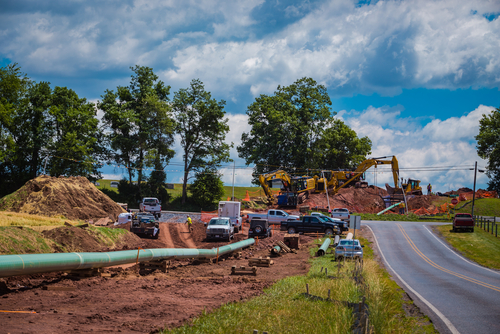
New England states need increased natural gas pipeline capacity, something Pennsylvania could help them with if certain other states would cooperate.
In fact, a lack of pipeline capacity currently contributes to skyrocketing energy costs in the region that some sources estimate are 50 percent above the national average.
“Our vast natural resources have made Pennsylvania the energy leader of the East Coast,” first-term U.S. Rep. Dan Meuser (R-PA) told Pennsylvania Business Report. “Pipelines are a safe, reliable way to supply low-cost natural gas to consumers here in the Commonwealth and to our friends in the Northeast, and to spur job growth and help to support our growing economy.”
But the state has hit major transport blockage.
“The current roadblock is the environmental permitting process in the State of New York,” explained Rep. Meuser. “I firmly believe that states should have the ability to regulate pipelines within their jurisdiction, but New York is playing political games that have implications on our nation’s energy and national security.”
In fact, New York Gov. Andrew Cuomo’s natural gas pipeline ban may be unconstitutional.
Gov. Cuomo is abusing the federal Clean Water Act to prevent the construction of natural gas pipelines across the state, according to Chuck DeVore, vice president at the Texas Public Policy Foundation and a former California legislator, in a May 6 policy column in Forbes magazine.
Not only does such action deny New Yorkers of “a reliable, less expensive, and cleaner source of energy,” but it also denies the same benefits to New Englanders, he wrote.
As part of his efforts, Congressman Meuser in March joined House Republican Whip Steve Scalise (R-LA) and other colleagues to launch the House Energy Action Team (HEAT), a contingent supporting the development, deployment and environmentally friendly use of all-of-the-below and all-of-the-above energy resources, including fossil fuels and renewable energy sources like natural gas, coal, oil, nuclear, solar, thermal and hydroelectric.
“In Pennsylvania, we’ve got the second largest reserves of natural gas in the country,” said Rep. Meuser. “Our Philadelphia-area refineries have among the highest-quality standards in the world. These are things we need to maximize and promote. We need to be real with the American people and deliver affordable, accessible, environmentally friendly energy for our country.”
To help Pennsylvania and other states move forward in the pipeline arena, Meuser and his colleagues plan to push for reforms.
“Pennsylvania is making great strides in the pipeline infrastructure buildout, but the permit review timeliness and consistency will always remain stumbling blocks,” he said last week. “Regulatory reform and clear building requirements are what the industry needs.
And that’s what his constituents want, Meuser said.
“As I travel around the Ninth District, meeting with farmers, families, workers, and business owners, it becomes increasingly apparent that our towns and cities are primed for revitalization,” said the congressman. “Affordable, efficient and reliable energy is essential to that.”
At the same time, he added, “the property rights of my constituents must be respected and handled in a highly compliant and community favorable manner.”
According to Industrial Energy Consumers of America (IECA), reform also rings true for manufacturers.
IECA — a nonpartisan association of leading manufacturing companies collectively having $1.0 trillion in annual sales, over 3,700 facilities nationwide, and more than 1.7 million employees worldwide — says that federal lawmakers must hasten sufficient natural gas pipeline capacity to serve both the domestic consumer market, as well as the growing LNG and Mexico export markets.
If there isn’t enough pipeline capacity, IECA thinks it won’t matter how much natural gas resources are in the ground because transport will remain a problem.
Additionally, manufacturers already are suffering from inadequate pipeline capacity regionally, IECA President Paul Cicio says in comments submitted July 11 to the U.S. Senate Energy and Natural Resources Committee.
IECA has asked the committee to hold an oversight hearing on the matter.
“The U.S. is flying blind without a study,” Cicio said. “The reliability of the entire natural gas and electricity markets are at stake.”
Cicio called it “wishful thinking” that natural gas pipelines will get built in time to meet higher export and domestic demand.
“Inadequate pipeline capacity is a deterrent to economic growth and jobs, and prevents manufacturing companies from expanding production,” Cicio wrote in his comments to the committee. “The problem becomes especially acute during high summer or winter demand.”
Blocking pipelines, as New York has done, also means states and local jurisdictions must reach out to outside supply sources, which oftentimes are foreign companies.
In Boston, for example, Exelon Generation’s Everett LNG Facility has imported gas for the last two winters from Russia because the company doesn’t have the pipeline capacity to get a flowing shale supply from Pennsylvania.
The U.S. Energy Information Administration’s Annual Energy Outlook 2019 essentially supports constructing the United States pipeline infrastructure for transporting oil and natural gas, which the federal agency says can be expected to supply more than 50 percent of America’s energy at least through 2050.